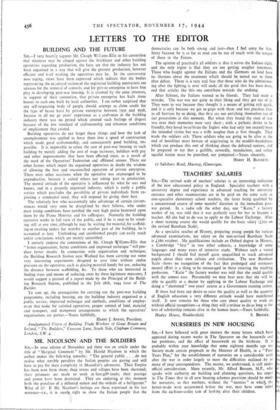LETTERS TO THE EDITOR
BUILDING AND THE FUTURE
Stn,—I very heartily support Mr. Clough WiTams-Ellis in his contention that whatever may be alleged against the bricklayer and other building operatives regarding production, the facts are that the industry has not been organised in a way that will give the greatest production, however efficient and hard working the operatives may be. In the controversy now raging, views have been expressed which indicate that the bodies representing the or;anised section of the registered building contractors are anxious for the removal of controls, and for private enterprise to have free play in developing post-war housing. It is claimed by the same interests, in support of their contention, that private enterprise has built three houses to each one built by local authorities. I am rather surprised that any self-respecting body of people should attempt to claim credit for the type of house built by private enterprise between 1931 and 1938, because in all my 40 years' experience as a craftsman in the building industry there was no period which created such feelings of disgust because of the low standard of craftsmanship and inhuman conditions of employment that existed.
Building operatives do not forget these things and how the lash of unemployment was applied to force them into a speed of construction which made good craftsmanship, and consequently good building, im- possible. It is impossible to relate the cost of post-war housing to such building by merely adding the cost of wage increases, holidays with pay and other improvements that have been effected since, as a result of the work of the Operatives' Federation and affiliated unions. There are other factors which impel the organised operatives to doubt the wisdom of allowing the free and uncontrolled operation of private enterprise. There were other occasions when the operative was encouraged to be unproductive, because it suited others not taking 'part in production. The mental attitude of the operative is influenced by what he sees and knows, and in a properly organised industry, which is really a public service which precludes the possibility of private individuals from ex- ploiting a communal need, they will respond by giving their best.
The relatively few who occasionally take advantage of certain circum- stances would very soon be disciplined by their fellows, who under most trying conditions have justified the very high prise bestowed upon them by the Prime Minister and his colleagues. Normally the building operative works in full view of the public, and if he is seen to be stand- ing still at any time, although he may be waiting for material, for scaffold- ing or awaiting orders for transfer to another part of the building, he is accounted as lazy. Unthinking and uninformed people can easily reach unfair conclusions which are mainly unjustified.
I entirely endorse the contentions of Mr. Clough Williams-Ellis that " better organisation, better conditions and improved technique" will pro- duce better results. In connection with organisation and technique, the Building Research Station near Watford has been carrying out some very interesting experiments designed to save time without undue pressure on the operative, such as placing material handy for use, reducing the distance between scaffolding, &c. To those who are interested in finding ways and means of reducing costs by these legitimate measures, I would suggest a perusal of a report made by the Principal of the Build- ing Research Station, published in the July 28th, 1944 issue of The Builder.
To sum up, the prerequisites for carrying out the post-war building programme, including housing, are the building industry organised as a public service, improved technique and methods, conditions of employ- ment that make for satisfied operatives, proper control of land, material and transport, and manpower arrangements to which the operatives' organisations are parties.—Yours faithfully,
HARRY J. ADAMS, President.
Amalgamated Union of Building Trade Workers of Great Britain and Ireland, " The Builders," 'Crescent Lane, South Side, Clapham Common, London, S.W. 4.


























 Previous page
Previous page